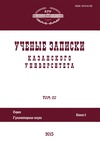Философ-революционер: мотив освобождения в платоновском мифе о пещере
A Revolutionary Philosopher: A Theme of Liberation in Plato’s “Allegory of the Cave”
Author(s): K. V. KondratievSubject(s): Education, Ancient Philosphy
Published by: Казанский (Приволжский) федеральный университет
Keywords: education; liberation; reality; phantom; conversion of knowledge stage;
Summary/Abstract: In this paper, we consider the “Allegory of the Cave” – a well-known part of the “Republic” by Plato. However, the conventional interpretation of this fragment – the image of Plato’s form theory – does not regard themes, which Plato clearly remarks as principal. The paper discusses the image of “liberation” in its relation to the image of “education”. The aim of the study is to determine the relations between the stages of education and the conversion of knowledge condition. The main method of the study is hermeneutic analysis of the original text and modification of the interpretative context. In the course of study, we have identified the following stages of education: 1) chained prisoners; 2) people, who take utensils and images at the upper road; 3) liberated prisoners; 4) a person, who liberates the prisoner; 5) the prisoner, who gets out from the cave. All of these stages of education are related to the stages of knowledge, but we should not consider its conversion in the sense of gradual increase: in fact, during these changes not only knowledge can be declined, but also the transit from the first false reality image to another one is possible. It has been suggested that the prisoner does not gain true liberation outside the cave, but rather falls to another phantom reality, larger than the previous one. It has been concluded that the only possibility of education growth and conversion of the knowledge stage is the moment of transit from one cave to another one.
Journal: Ученые записки Казанского университета. Серия Гуманитарные науки
- Issue Year: 160/2018
- Issue No: 4
- Page Range: 971-976
- Page Count: 6
- Language: Russian

